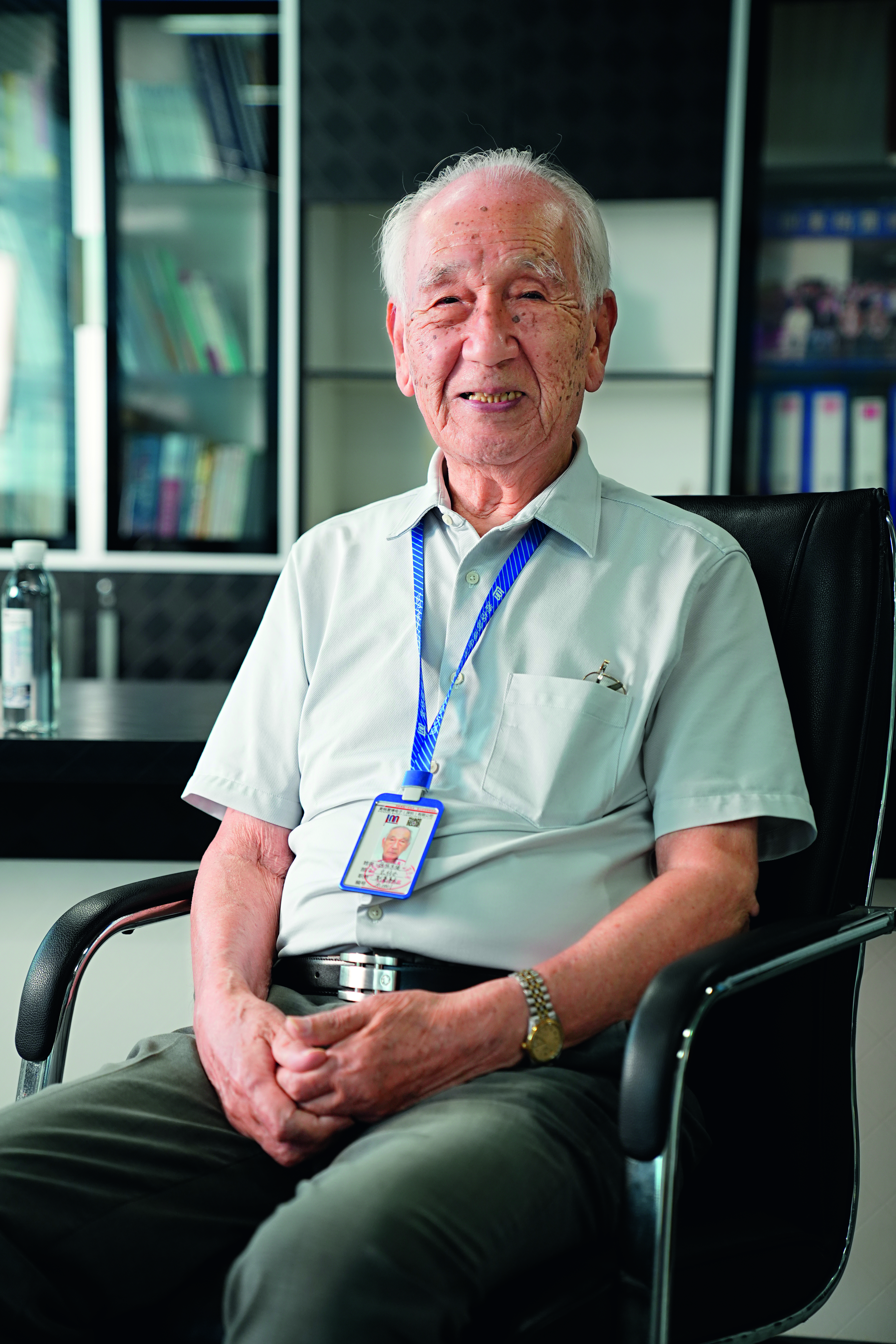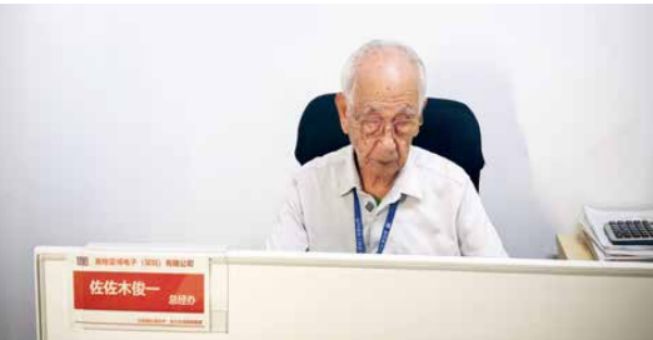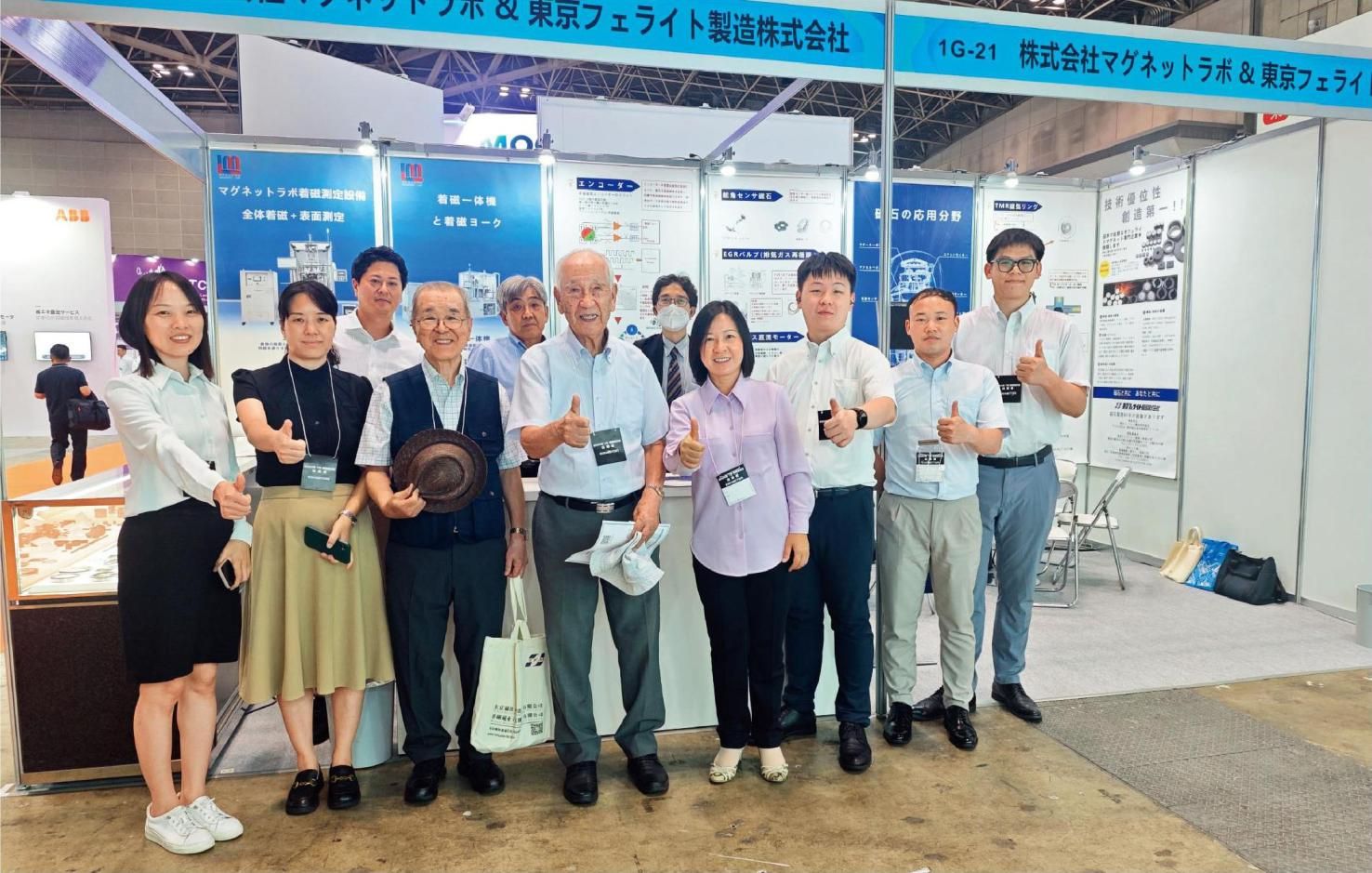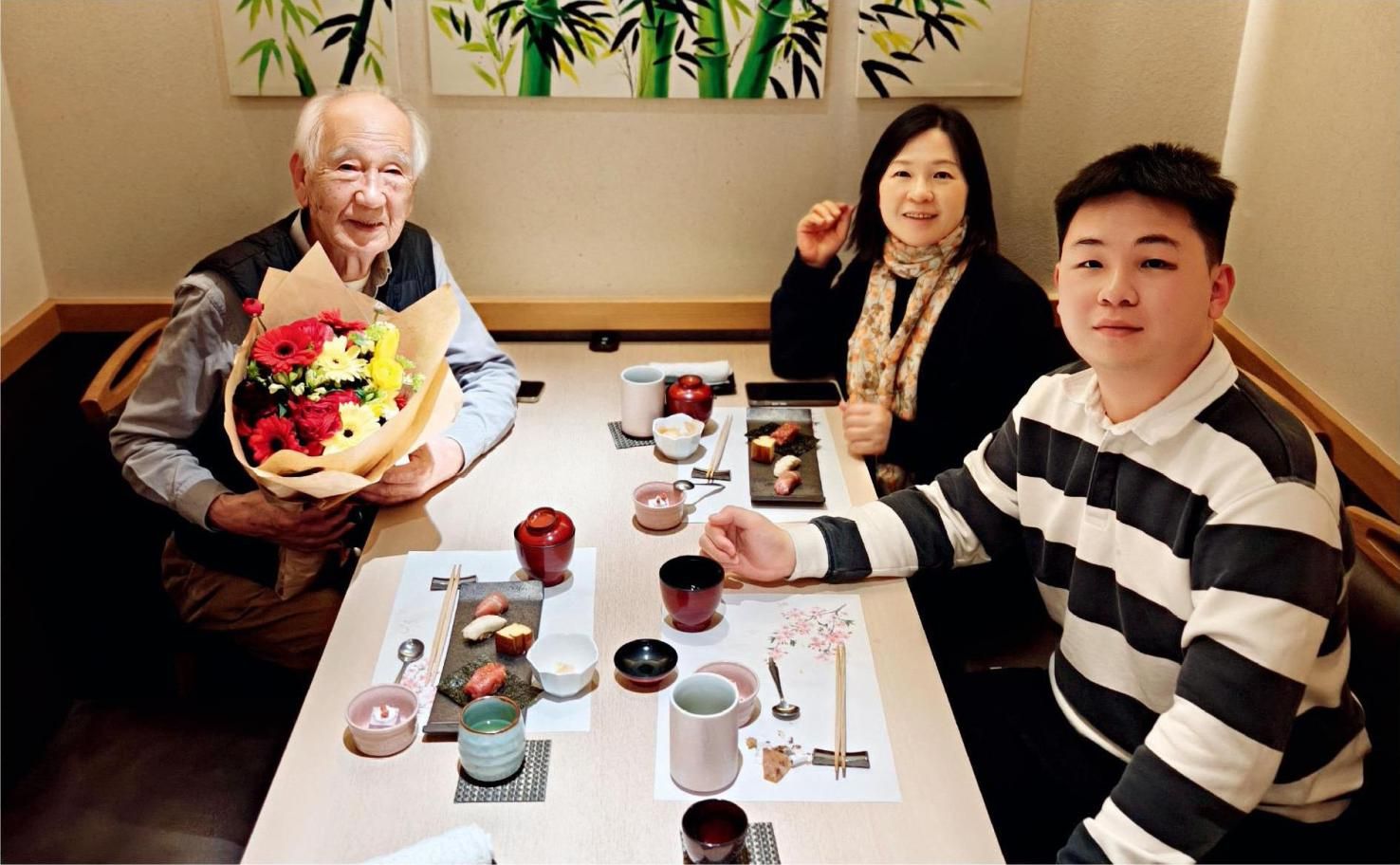Shunichi Sasaki
Born in 1933 in Sendai, Japan, Shunichi Sasaki graduated from Tohoku Gakuin University in Japan. He moved to Shenzhen in 2003 and served as President of Meglab Electronics (Shenzhen) Co., Ltd. He is currently the Vice Chairman of the company.

In August 2024, Shunichi Sasaki was interviewed by Global People in Shenzhen.
Shunichi Sasaki, born in 1933 in Sendai, Japan, has spent the past 21 years in Shenzhen, where he has fully embraced the city’s dynamic spirit and become a true "Shenzhener." After founding Meglab Electronics (Shenzhen) Co., Ltd. in 2003, he led the company to success, now employing over 500 people. At 91, Sasaki remains deeply involved in the company, working closely with his team without a separate office. His character—marked by humility, dedication, and a commitment to hands-on leadership—has earned him respect and admiration in the business community. Sasaki's journey reflects his deep connection to Shenzhen and his belief in the power of innovation, collaboration, and lifelong contribution.
He wakes up at 7 a.m., arrives at the company in Longhua District, Shenzhen, before 8:15 a.m., and then sits at the corner desk, puts on his reading glasses, and starts working meticulously. This is the daily routine of the 91-year-old Japanese man Shunichi Sasaki (hereafter referred to as Sasaki).
Twenty-one years ago, when he was already in his 70s, Sasaki came to China alone and founded Meglab Electronics (Shenzhen) Co., Ltd. With fewer than 10 employees at the beginning, the company now boasts over 500 staff members, with branches in Tokyo, Japan, and Bangkok, Thailand, and has built a loyal customer base worldwide. The scale of the business has grown steadily, and Sasaki himself remains the oldest foreign expert in China holding an employment permit. Despite his success, he remains humble and approachable. At the company, Sasaki does not have a separate office.He is active on the front lines daily—replying to work emails, answering technical questions from subordinates, preparing speeches for industry forums, and more.
The interview with Sasaki took place after his lunch break. He walks briskly but speaks slowly. Reflecting on his more than 20 years in China, Sasaki smiled and said, “The development of all this was beyond my plan. I can say this has been my ‘extra life’ after turning 70.”

Shunichi Sasaki working at his desk.
"The Blessing of the Times"
Sasaki was born into a family of technicians in Sendai, Japan. From a young age, he exhibited a strong interest in the natural sciences, often reading science magazines and investigating problems until he found the solutions. On one occasion, while riding in a car, he passed a construction site and saw a crane. Sasaki became fascinated with how it extended and lowered. This habit of questioning everything around him has been a constant throughout his life.
Sasaki worked as an engineer for about ten years, and at the time, he was an outsider to the field of magnetic applications. In 1965, at the age of 32, he joined a company focused on magnetic energy, marking his first involvement in magnetic technology development. To understand the principles of the technologies he was working with, he taught himself by spending hours in the library, immersing himself in the world of magnetic knowledge. Later, Sasaki founded Meglab Co., Ltd. in Tokyo, providing magnetization products to factories that assembled household appliances, with a focus on serving the global high-end manufacturing industry. This was in 1979, during Japan's rapid economic growth period. With the popularization of appliances like microwave ovens and audio systems, the demand for magnetized components was enormous. At the same time, China was at the early stages of its reform and opening-up, and Shenzhen, at the forefront of this change, had convenient transportation links to Japan. Many foreign businesses witnessed firsthand the dramatic transformation taking place in Southern China.
In 2001, after China joined the World Trade Organization, the country gained greater opportunities for development, and an increasing number of foreign companies, including Japanese firms, began setting up branches in China. Sasaki observed that, at the time, China’s magnetic technology was relatively underdeveloped. When Japanese companies’ equipment encountered problems, they had to send it back to Japan for repairs, leading to high transportation costs and long delays. After conducting thorough market research, Sasaki decided to move to Shenzhen in 2003.
Upon arriving in Shenzhen, Sasaki was greeted by a large slogan: "Once you come, you are a Shenzhener." In Sasaki’s eyes, this perfectly encapsulated Shenzhen's spirit of openness—maintaining an inclusive attitude towards external influences is key to leading the trends of the times. With the help of his clients, Sasaki founded Meglab Electronics (Shenzhen) Co., Ltd., focusing on the research and development, as well as the manufacturing of magnetization, demagnetization, magnetic measurement, and magnetic field orientation technologies.
In the early 21st century, smartphones became immensely popular in China, creating strong demand for magnet-related components, which opened new opportunities for Sasaki's business. Later, the rise of China's electric vehicle industry brought another wave of market benefits for magnetic components, leading the company to operate around the clock to meet production and shipping demands. This energetic drive, full of hope for the future, gave Sasaki a renewed sense of prosperity. “I feel incredibly fortunate; my entrepreneurial journey has truly benefited from the times,” Sasaki said. “The demand for magnetic applications in China is impressive, and I’ve never encountered insurmountable challenges during my start-up phase.” With his knack for forecasting trends, Sasaki sees future growth in China's magnetic applications focusing on high-speed rail, electric vehicles, and wind power generation.
Sasaki told the reporter that his greatest takeaway from starting a business in China was the strong support provided by the local government to entrepreneurs. When he first started his company in Japan, it was small, with few employees and low sales, so he couldn't benefit from government support and had to rely solely on himself to grow the company. However, in China, loans from the government or investment companies have been very effective. "Shenzhen is full of vitality, and people tend to think more about how to utilize surrounding resources. For example, if I have money and you have products, we can collaborate. Positive collaboration has driven the development of local businesses."
Sasaki originally planned to run the company for three years, then return to Japan to reunite with his family. However, once the business was on track, he struggled to find a suitable successor. At the same time, Sasaki gradually grew fond of the thriving atmosphere in Shenzhen. As a result, he decided to "stay indefinitely" in the city.
This "stay" lasted 21 years. During this time, Sasaki remained active on the front lines of the magnetic energy industry, playing a key role in drafting international standards related to overall magnetization technology. He has been hailed as a "pioneer in the international development of magnetic energy technology." Today, the company not only has a development base for magnetic energy applications, but its independently developed core magnetization technology has led to over 100 intellectual property rights, including patents, utility model patents, and software copyrights. These innovations span emerging industries such as new energy vehicles, rail transportation, wind power generation, drones, and consumer electronics.
Sasaki has also worked with several Chinese experts to establish an academic and expert workstation, and founded an innovation and entrepreneurship practice base for university students at Southeast University. He has been dedicated to nurturing young talent in magnetic processing technology and actively contributing to the promotion of Sino-Japanese exchange in the magnetic energy industry.
Behind his achievements, Sasaki has invested tremendous effort. "He has a selfless passion and obsession for his work," recalled an employee who had worked with Sasaki for many years. "Once, after having breakfast, we went to visit a client. We worked until 8 p.m., and he didn’t even remember to eat until everything was finished."

In July 2024, Shunichi Sasaki (fourth from the left, front row) traveled with colleagues to Tokyo, Japan, to attend a cutting-edge technology exhibition.
"A Local Shenzhener"
From initially being "forced to stay" to adapting to the high efficiency and fast-paced lifestyle, and finally resonating with the rhythm of Shenzhen, Sasaki now feels like a "Shenzhener" just like the locals. "When I was younger, I enjoyed playing baseball. Now, I prefer walking and traveling. Every year, I visit Xinjiang or Sichuan for a trip to the mountains. In my daily life, I enjoy strolling through the city, passing by the hurried people on the streets, and I feel like I’m one of them, a local Shenzhener."
Sasaki has personally witnessed the earth-shaking changes in Shenzhen, with the most striking being the increasing number of skyscrapers and the development and improvement of various infrastructures. "More than 40 years ago, when I first came to Shenzhen from Tokyo, I had to fly to Hong Kong, then take a bus to Shenzhen, or catch a ferry from Hong Kong. Now, I can get from Shenzhen to Hong Kong in less than an hour," he marvels at such changes, describing them as "like magic." However, adapting to Shenzhen's rapid pace was not an easy task for foreign companies. "In Japanese corporate culture, we tend to hold numerous meetings and discussions without reaching immediate conclusions. But one of the most obvious characteristics of Shenzhen companies is decisiveness and prompt action. They make quick decisions, even though this sometimes brings risks, but it's refreshing. Correspondingly, Shenzhen has a higher tolerance for failure." Sasaki says that this mindset has brought high efficiency to Shenzhen, adding, "I’m also working hard to learn from Chinese companies."
Sasaki has observed that, "Japanese people tend to insist on developing products entirely in-house, from start to finish. But Chinese people prefer and excel at 'importing'—for example, bringing in related products from Europe, assembling and adjusting them for operation, while simultaneously learning and researching to 'digest' the relevant technologies. They then make further adjustments and innovations, creating even better products on this foundation. This unique ability to optimize has laid the foundation for China’s rapid technological progress."
Chinese people are good at resource integration, "This allows them to bring together capable individuals and combine technology and capital, which strengthens the company's cohesion. On the other hand, Japanese people tend to be more independent, often thinking of growing their company through their own efforts without relying on external forces."
"Whether in Japan or China, there is a mindset that is universal across the world: the desire to be needed and to contribute to others," Sasaki said. "People around me often joke that I should stay for another 5 or 10 years, or even longer...... I’ve lived in China for so many years, and I feel a strong sense of happiness. People around me care about me, which allows me to fully dedicate myself to my work." Sasaki emphasized that this feeling of being "needed" gives him more motivation and anticipation in life. This is also one of the reasons why he doesn’t have an independent office. "I want to work in the same place, at the same time, with everyone. The company initially prepared a single office for me, but if I had that, I wouldn’t be able to understand the work situation of the others. So, I proactively requested to work in the same office as everyone. This way, I can also offer help to the younger generation where possible." Sasaki explained, "For the manufacturing industry, the patents and knowledge of skilled technicians are the source of competitive strength. I want to pass on the technology I’ve mastered to young people. Some segments of the magnetic energy field are developing very slowly, and these skills can only be passed down through the hands-on teaching of seniors, requiring a great deal of experience and patience. We cannot overlook the transmission of technology between people."
"I have always been doing the work I love, maintaining curiosity about things, and continuing to learn. This is how one can cultivate the mindset of a craftsman. If you work solely for money, it is impossible to sustain the work in the long run. When we find joy in solving work-related problems, we also discover the meaning of life." According to Sasaki, the inheritance of craftsmanship requires an experiential "feeling" in order to truly appreciate things and recognize the value that cannot be seen by the eye. "Of course, relying solely on feeling is not enough; it is also necessary to standardize the precise technical skills so that the younger generation can pass them on accurately."
When asked how he would describe Shenzhen, Sasaki chose the words "youthful, growing, and future-oriented," and noted that he no longer judges the city from a foreigner’s perspective. He is optimistic about Shenzhen’s development, believing that this young city carries the mission of driving business and economic growth, with limitless potential. "The greatest wealth of young people is time, which is especially important in Shenzhen, where 'time is money and efficiency is life.'"

Shunichi Sasaki with Peng Lin (center) and Peng Junlin (right).
"Be strict with oneself and lenient with others"
Sasaki’s family, who live in Japan, have always hoped he would return to live there. He visits Japan every year to see them, but he has gradually found himself unable to adapt to life there anymore. The transportation system has also changed from what he remembered. On top of that, many of his relatives and friends have passed away, and he finds himself at a loss with many things in Japan. "Now, when I go back to Japan, I feel more like a guest—everything seems somewhat unfamiliar. Of course, I’m a guest here in China as well, but everyone is making an effort to take care of me. For instance, the Chairman of the company, the first thing she does when she arrives at work every day is to check how I’m feeling. If I look healthy and glowing, she’s very happy. If I seem a bit down, she becomes very concerned."
Due to his advancing age, Sasaki has gradually transferred most of his company shares to the current Chairman, Peng Lin. "I mainly focus on technical research and development, while the Chairman is responsible for business matters such as financing and acquisitions."
Peng Lin's son, Peng Junlin, also works at the company. In Peng Junlin's eyes, Sasaki is a kind and warm elder. "He’s not the type of elder who likes to lecture or discuss life philosophy in grand terms. Instead, he leads by example, using his words and actions to inspire others. He embodies the principle of 'strict with oneself, lenient with others' from Chinese culture." Peng Junlin's family lives close to Sasaki and cares for him like a family member. When the family goes out, they often invite Sasaki to join them.
In his free time, Sasaki enjoys reading books and watching television at home. He has also picked up a hobby from his university days—building models—and has formed a close friendship with his 5-year-old neighbor. "He calls me 'grandpa.' We have a great relationship, and I take him to the amusement park every week. Playing with kids is a lot of fun, though it requires a lot of energy."
During the interview, Sasaki’s expression was calm and focused, with few signs of emotional fluctuation. However, when talking about his 5-year-old Chinese friend, his eyes softened with warmth, and his tone was filled with pride.
"If time could go back 20 years, I would still choose to come to China. And as long as I am still able to work, I will continue to stay here," Sasaki said.
 Editor:Feng Lu
Editor:Feng Lu